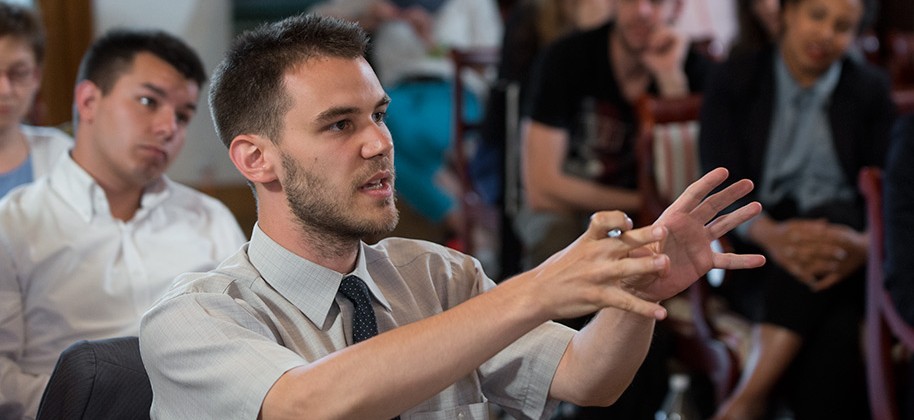
Presentation of the laboratory projects
Dominika Kasprowicz, deputy director of the Villa Desius Association, reminded of the fact that the workshop part of this year's VSS edition was so intensive as never before. So, it was a special premiere to see the outcomes of the participants' work in the laboratories which all focussed on 'creation, innovation and synergy'.
Labs Culture – final presentation
Joanna Orlik was the tutor of the Culture Lab during the last sessions. She informed the audience about what was the initial idea of the projects developed in the Culture Lab: “The basis for all projects is cooperation. And the basis for cooperation are common values.“ But referring to common values is sometimes not easy at all because we might mean something else when we talk about the same value, as Joanna Orlik admitted pointing to experience from the work in the Lab. There were four groups in the Culture Lab, and each of them worked out a cultural projects on the basis of a common value: The „Love”group presented a project against prejudices (”The right impression“) using interactive screens in the public space as means of social experiment. The group ”Responsibility“ developed a project of workshops during four weeks where unemployed people learn how to profit from their knowledge (“Take it!“). Outcome of the “Truth” group was the educational project “Media views“ which aims at teaching students how to deal with media information in order to find out what is really going on in the world. Different interpretations of the same story and manipulation mechanisms shall be thematized. And the fourth group – “Freedom” – presented the project “You are free to choose“ to be implemented in primary schools in Hungary. By presenting life stories of successful Roma, prejudices among non-Roma pupils shall be abolished, and, above all, Roma pupils shall be encouraged to aspire after high goals in their life.
Labs Business – final presentation
Aleksandra Przegalińska – assistent professor at Kozminski University - the tutor of the Business Lab to give some introductory words about the projects she coached. It were projects comprising startups in the business world which had to be innovative and to hold out the prospect of financial success. The first gruop presented their idea of the language learning platform “Magelan“, an educational mobile application which shall facilitate most comfortable language learning with virtual trips abroad and communication with native speakers. The project of the second group was about printing three-dimensional books – books which are customizable (being digitally available but also tangible in physical form – thus, a better alternative to electronic books), which allow own creative cover designs, which are recyclable and ideal for selfpublishing untertakings. Another project of the Business Lab was “Unita“ – a mobile application designed on friendship that helps to find someone in the immediate vicinity for sharing free time activities (“Finding company has never been easier“). The fourth group presented their project “Kuchnia Konfliktu“. Facing the recent radicalization and increasing xenophobia, they want to establish public citchens in cooperation with refugees in Warsaw – a culinary way to promote cultural diversity, to foster tolerance and integration processes.
Labs Acdemy – final presentation
Finally, Felix Kaputu, scholarship holder of the Villa Decius, shortly introduced the projects that were the outcome of his Academia Lab under the headline “local space and responsibility“. There were two groups that did empirical research in Krakow for quantitative analysis. One group investigated in what way does social media usage influence museum-audience engagement. They conducted a case study in the Museum of Contemporary Art in Krakow (MOCAK), surveyed 40 of its visitors and one of its promotion managers, compiled statistics and assessed them. The second group of the Academia Lab presented the results of their empirical study on the decicive factors on customers' loyality in Cracow's restaurants. They did quantitative surveys in 24 restaurants around the Rynek Główny and took into account two points of view: the opinion of the customers about the restaurant and the opinion of the employees about the profit ability of their restaurant. They cared much more about the atmosphere, comfort, service quality and – most improtant factor – food quality.
It was clearly perceptible that the laboratory projects were the outcome of intensive work. Their presentations where the participants' last challenge of the Visegrad Summer School – a lesson about how to sell yourself, how to confidently answer questions of the audience and to be able to accept constructive criticism. What is also notable: For all groups, synergy turned out to be the main break-through.
by Jill-Francis Käthliz












